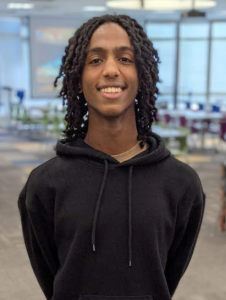17-Year-Old Black Teen From New Jersey Scores Perfect 1600 on SAT — A Story of Discipline, Dreams, and Defying the Odds
In a moment that has captured hearts and headlines across the nation, 17-year-old Elijah Foster, a high school senior from Newark, New Jersey, has achieved what most students only dream of: a perfect score of 1600 on the SAT. This rare academic feat — accomplished by fewer than 1% of test-takers each year — is not only a testament to Elijah’s intellect, but also a powerful example of discipline, perseverance, and the strength of belief in oneself.
Born and raised in a working-class neighborhood in Newark, Elijah’s journey is one of quiet focus and humble beginnings — and now, the country is watching as this extraordinary young man steps into a spotlight he never sought, but surely earned.
The Road to 1600
Elijah Foster didn’t come from a family of Ivy League graduates or elite tutors. His parents, Monica and Darrell Foster, both work full-time jobs — Monica as a nurse, and Darrell as a mechanic. Education was always valued in the household, but resources were limited.
“I didn’t grow up in a house full of test prep books,” Elijah said with a smile. “But my parents gave me something even more important — they always told me I could be anything, and they meant it.”
Elijah first took the PSAT in his sophomore year, scoring well above average. That experience lit a fire in him. He became fascinated with testing strategy, spending hours watching free YouTube tutorials, using Khan Academy, and borrowing practice exams from the public library.
“I wasn’t aiming for 1600 at first,” he admitted. “I just wanted to improve. Then I saw how much progress I was making, and I started to believe maybe… just maybe, I could do something big.”
Self-Discipline Over Circumstance
Unlike many top scorers who can afford private test prep services, Elijah created his own structured routine. He studied every morning before school and again at night after homework — often sacrificing weekends with friends and downtime on social media.
“I had to be honest with myself,” Elijah said. “I knew I wasn’t the smartest kid in every room. But I could outwork anyone. And that’s what I did.”
His school, Central High in Newark, didn’t offer a formal SAT prep course, so Elijah approached teachers on his own time to ask questions. His AP English teacher, Ms. Ramirez, said he stood out early on.
“Elijah doesn’t just do the work — he thinks about the why behind everything,” she said. “He wasn’t just studying vocabulary. He was studying patterns, understanding structure. It was clear he had a gift for critical thinking.”
The Morning of the Test
On the morning of the SAT, Elijah followed his usual routine — oatmeal with cinnamon, a short walk around the block, and 10 minutes of quiet breathing. He said he wasn’t nervous, but focused.
“I told myself, this is just another practice. I’ve done this a hundred times.”
He took the test in March. Six weeks later, when he logged into the College Board website and saw “1600” flash across the screen, he didn’t scream. He didn’t run to call friends. He just sat quietly, stunned.
“I thought maybe it was an error,” he laughed. “I refreshed the page three times.”
Then he called his mom. “She cried,” Elijah said. “And then she made me check the score again — just in case.”
National Attention and Ivy League Interest
News of Elijah’s perfect score quickly spread beyond Newark. His principal announced it during a school-wide assembly, and soon after, local news stations showed up at his doorstep.
The real flood, though, came in the form of college emails.
Harvard. Princeton. MIT. Stanford. They all reached out, expressing strong interest in Elijah and encouraging him to apply. Several offered all-expenses-paid visits.
But Elijah remains humble. “I’m honored. But I know one score doesn’t make me who I am. I still have work to do.”
What He Wants Next
Elijah plans to study computer science and artificial intelligence, fields he says will shape the future. He dreams of creating accessible technologies to help underserved communities — especially in education and healthcare.
“My goal isn’t to get rich,” he said. “It’s to make tools that give kids like me a chance. Technology should level the playing field — not widen the gap.”
He’s currently applying to several top-tier universities, but says he’ll choose the one where he feels he can grow the most — not just academically, but as a leader.
A Message to Other Students
For Elijah, his score is more than a number — it’s a message to students everywhere, especially other Black teens who rarely see themselves represented in stories like his.
“You don’t have to be a genius. You don’t have to be rich. You just have to be consistent and believe in your own mind,” he said. “Don’t let anyone put limits on you — not teachers, not test scores, not your neighborhood.”
His story is already inspiring others. Since the news broke, several Newark students have asked him for help forming a study group. Elijah agreed, and now leads Saturday morning prep sessions at the community library.
“If I can reach back and pull someone else forward,” he said, “then I’m doing something right.”
Community Pride
In a city often overshadowed by crime statistics and poverty narratives, Elijah Foster has become a symbol of hope. Mayor Ras Baraka called him a “bright light in a world that desperately needs more of them.”
His parents are still processing it all. “We always knew he was special,” Monica Foster said. “But now the world knows, too.”
Conclusion: A Future Without Limits
Elijah’s perfect SAT score is more than an academic achievement. It’s a story of grit, discipline, community support, and a refusal to be boxed in by circumstances. In a society that often underestimates the potential of Black youth, Elijah’s triumph is a powerful counter-narrative — one that reminds us that brilliance exists in every zip code, every classroom, and every family.
With college on the horizon and his future wide open, Elijah isn’t celebrating just yet. He’s focused, grounded, and thinking ahead.
“I want this to be the beginning, not the peak,” he said. “The real test is what I do next.”

